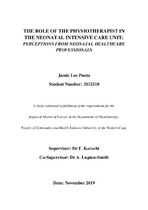| dc.description.abstract | Background: The role of the physiotherapist in the neonatal intensive care unit is unclear. How other neonatal healthcare professionals and physiotherapists themselves perceive their role in the management of neonates, their practice patterns and services, their role in the neonatal intensive care multidisciplinary team, their use of evidence-based practice and awareness of the profession in this setting has not been well explored. This information is lacking in the South African healthcare context as well. Therefore, the aim of the study was to explore and describe the perception of doctors, nurses and physiotherapists of the role of the physiotherapist in public and private sector neonatal intensive care units in South Africa. Methods: A qualitative exploratory research design was used. All medical practitioners (paediatricians and neonatologists), nurses and physiotherapists working in the neonatal intensive care units in two private sector and two public sector hospitals in the Cape Metropole region in the Western Cape South Africa who provided consent to participate were included. An inclusive (total population) sampling method was used where all healthcare professionals working in these units were invited to an individual face-to-face audiotaped interview using a semi-structured interview guide and conducted by the researcher at a time and place convenient to the participants following informed consent. Data was transcribed verbatim and analysed using both deductive and inductive thematic content analysis to develop codes, categories and themes. Trustworthiness was ensured by ensuring credibility, conformability, dependability and transferability of data. Ethics was obtained from the relevant Institutional Review Board. Results: Twenty-one healthcare professionals participated, including doctors (n=5), nurses (n=6) and physiotherapists (n=10). The mean age in years of the participants was 41+/–11 years with the physiotherapists having the lowest mean age. The participants had various years of general and neonatal intensive care experience and physiotherapists in specific only had basic undergraduate qualifications with minimal specialised training in neonatal intensive care. Five major themes emerged namely: i) the role of the physiotherapists in the management of the neonatal ICU patient, ii) practice patterns and services iii) teamwork iv) training and qualifications including evidence-based practice, v) awareness of and exposure to neonatal intensive care physiotherapy. Conclusion: Physiotherapists working in this neonatal intensive care setting need to promote their profession through education of other neonatal healthcare professionals in order to improve awareness, referral patterns and integration into the multidisciplinary team. Evidence-based practices and improving training and skills development in the area of neonatal physiotherapy can be further explored in this setting. | en_US |

